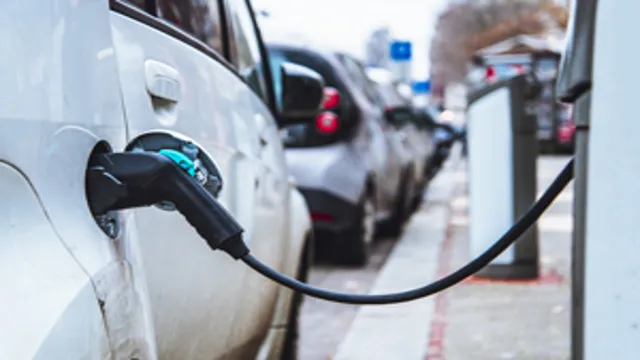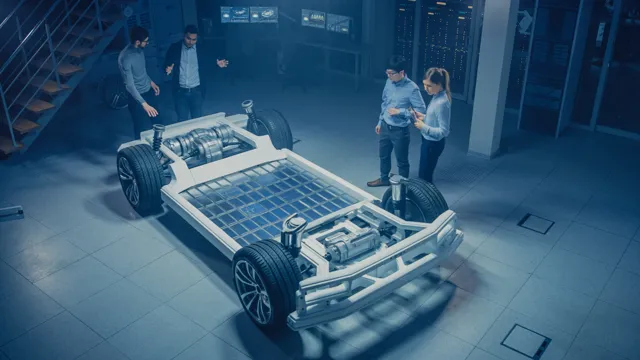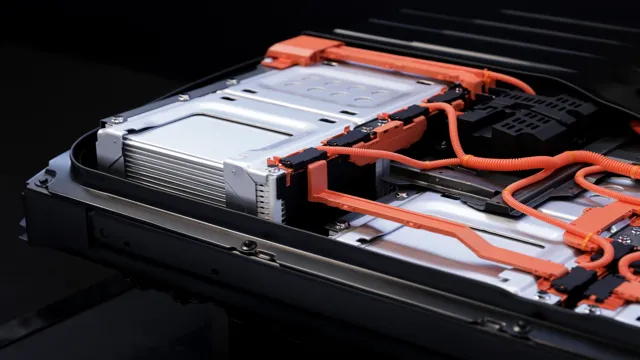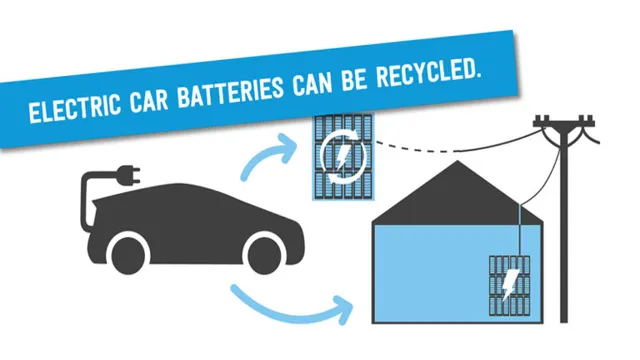The Future is Electric: How Electric Car Batteries are Revolutionizing Environmental Sustainability
Electric cars are becoming increasingly popular as people seek alternatives to fossil-fuelled vehicles amidst growing concern over the environment. However, there are concerns that the production of electric car batteries may come with various environmental consequences. As electric cars are becoming more mainstream, there is a growing need to understand the environmental impact of their batteries beyond their use in transport.
The production of electric car batteries involves extracting and processing raw materials, which can have a significant environmental impact. For instance, the mining of minerals such as cobalt, lithium, and nickel required to manufacture electric car batteries can result in water and soil pollution, habitat destruction, and loss of biodiversity. Furthermore, the transportation of raw materials and the manufacturing process result in greenhouse gas emissions.
It’s not just during production that electric car batteries can cause environmental issues. Once the batteries reach the end of their useful life, they can pose a disposal challenge. The recycling process for batteries can also be time-consuming and energy-intensive.
Failure to manage the disposal of batteries correctly can lead to soil, water, and air pollution, further exacerbating environmental problems. In summary, while the shift towards electric cars may be necessary, it’s important to consider the environmental impact of electric car batteries critically. As with any significant change, it’s crucial to be mindful of all the potential ecological consequences.
Electric Car Battery Basics
Electric car batteries have grown in popularity due to their eco-friendliness, reduced fuel costs and improved driving experience. These batteries are made up of thousands of small cells that work together to store energy. They are often made of lithium-ion materials which are recyclable and non-toxic, making them more environmentally friendly.
However, the manufacturing process of these batteries require minerals that have significant environmental impacts. Recycling is also important as it reduces the need for new batteries to be produced and can lessen greenhouse gas emissions. It’s important to consider the entire lifecycle of the battery, from its manufacture to its disposal when examining the environmental impact of electric cars.
While these batteries have a positive environmental impact in the long run, it’s crucial to monitor and improve the manufacturing process and disposal methods to ensure minimal environmental damage.
Composition of Electric Car Batteries
Electric car batteries come in different shapes and sizes but are essentially made up of similar components. They include an anode and cathode, a separator, and an electrolyte. The anode and cathode are made primarily of metal oxides like graphite and lithium cobalt oxide, respectively.
These metal oxides react with the electrolytes to release charged particles such as lithium ions, which travel through the separator to create an electric current. The separator is a membrane that keeps the electrodes apart while allowing the flow of charged particles. The electrolyte is a liquid or gel-like substance that conducts electricity while also providing insulation between the anode and cathode.
Electric car batteries are durable and efficient, making them perfect for powering electric vehicles. However, their composition can make them more expensive to produce than traditional car batteries. Nevertheless, advances in technology and economies of scale are helping to drive down costs, making electric cars more accessible to consumers.

Environmental Concerns with Battery Production
Electric car batteries use lithium-ion technology, which has become the go-to choice for many automakers due to its high energy density and long lifespan. However, the production of these batteries is not without its environmental concerns. Lithium is a finite resource, and the mining process can have negative impacts on ecosystems and local communities.
Additionally, the production of lithium-ion batteries requires large amounts of energy and produces greenhouse gas emissions, contributing to the global climate crisis. As the demand for electric vehicles increases, it is important for automakers to prioritize sustainable and ethical practices in battery production. This can include investing in alternatives to lithium, such as sodium-ion, and incorporating recycled materials into battery manufacturing.
By taking steps to minimize the environmental impact of electric car batteries, we can create a more sustainable future for transportation.
Lifecycle Analysis of Electric Car Batteries
Electric car batteries have been praised for their eco-friendliness, but it’s important to take a closer look at their lifecycle from mining to disposal. While electric cars produce fewer emissions than traditional gasoline vehicles, the production of batteries creates greenhouse gas emissions and relies on the mining of rare metals. However, advancements in technology and sustainable mining practices are working to reduce these impacts.
Once in use, electric car batteries can last up to a decade or more, significantly reducing the environmental impact of transportation. When the battery’s lifespan is over, it can often be recycled, further decreasing waste. It’s crucial to continue to explore and develop sustainable practices to minimize the environmental impact of electric car batteries throughout their entire lifecycle.
Environmental Benefits of Electric Cars
When it comes to the environmental benefits of electric cars, one aspect that often gets overlooked is the lifecycle analysis of their batteries. While it’s true that electric cars emit less greenhouse gases during operation, there are also environmental considerations in the production and disposal of the battery itself. However, researchers have found that electric car batteries actually have a lower environmental impact than traditional gasoline-powered car batteries over their entire lifespan.
This is because the production of electric car batteries has become more efficient and eco-friendly in recent years, and they can be recycled and repurposed after use. A research study conducted by lifecycle analysis experts found that electric car batteries have a significantly lower carbon footprint compared to traditional car batteries, even when considering the emissions from producing electricity for charging them. This shows that electric cars are a viable and environmentally sustainable option for the future of transportation.
Battery Recycling and Recovery
Electric car batteries play a vital role in reducing our carbon footprint and promoting sustainable transportation. However, it’s important to consider the environmental impact of the entire lifecycle of these batteries. From the mining of raw materials to the disposal of used batteries, each step has an impact on the planet.
A lifecycle analysis (LCA) of electric car batteries evaluates the environmental impact of the entire process, including production, use, and end-of-life disposal. This helps to identify ways to reduce the environmental impact and increase the sustainability of these batteries. Recycling and recovery of materials from used batteries can help reduce the amount of waste going to landfills and conserve natural resources.
In fact, many manufacturers have implemented closed-loop systems where old batteries are recycled and the recovered materials are used to make new batteries. By understanding the lifecycle of electric car batteries and implementing sustainable practices, we can ensure that we are not only reducing carbon emissions but also minimizing our impact on the environment.
Disposal of End-of-Life Batteries
Electric car batteries have a lifespan of 8-10 years, and once they reach the end of their useful life, their disposal can pose an environmental threat. A lifecycle analysis of electric car batteries involves assessing the environmental impacts of each stage of the battery’s life from production, use, and end-of-life disposal. While the production process for batteries emits a significant amount of carbon dioxide, the benefits of electric cars outweigh the environmental impacts caused by production, according to studies.
However, end-of-life disposal requires careful attention, whereas improper disposal can lead to the release of toxic chemicals that could harm the environment and human health. Therefore, recycling or reusing end-of-life electric car batteries is essential to prevent toxic waste and reduce further mining of materials used in battery production, such as lithium. Recycling and reusing end-of-life batteries provide an opportunity to extract valuable metals such as cobalt, nickel, and lithium while reducing the environmental impacts of their disposal.
Innovation in Battery Technology
Electric car battery technology has been advancing rapidly in recent years due to an increasing awareness of the environmental impacts of traditional combustion engine vehicles. As a result, battery manufacturers are developing innovative technologies to improve the efficiency and safety of electric car batteries while also reducing their environmental impact. For example, some companies are using recycled materials to create more sustainable batteries, while others are devising new chemistries that can store more energy in smaller, lighter packages.
Additionally, advanced thermal management systems are being developed to prevent batteries from overheating and catching fire, which has been a concern in the past. As electric car sales continue to rise and battery technology progresses, we can expect to see even more innovation in this space to enhance the sustainability and performance of electric vehicles.
Improvements in Battery Efficiency and Longevity
Battery technology has come a long way in recent years, and one of the most significant improvements has been in battery efficiency and longevity. Manufacturers are constantly innovating and developing new ways to make batteries more efficient and longer-lasting. One such innovation is the use of lithium-ion batteries, which are widely used in everything from smartphones to electric vehicles.
These batteries are much more efficient than traditional lead-acid batteries, and they can also last much longer. This is because lithium-ion batteries are rechargeable, and they don’t suffer from the same “memory effect” that can cause other batteries to lose their charge over time. Other advances in battery technology include the use of solid-state batteries and flow batteries, which offer even greater efficiencies and longer lifetimes.
With these advances, we can expect to see more widespread use of battery-powered devices and vehicles in the years to come.
Emerging Battery Technologies
Innovation in battery technology is constantly pushing the boundaries of what we thought was possible. From improving the power density and cycle life of lithium-ion batteries to developing completely new battery chemistries, researchers and engineers are tirelessly working to create more efficient and sustainable energy storage solutions. One of the most exciting emerging battery technologies is the solid-state battery.
Unlike traditional lithium-ion batteries that use a liquid electrolyte, solid-state batteries use a solid electrolyte, which allows for greater energy density and a longer lifespan. In fact, some experts predict that solid-state batteries could eventually replace lithium-ion batteries, leading to lighter and longer-lasting electric vehicles and more efficient renewable energy storage systems. As research and development continue to advance in the field of battery technology, we can only imagine the incredible innovations that are yet to come.
Conclusion
In conclusion, the future of the electric car battery is bright, but it’s important to consider the environmental impact as well. As the world shifts towards more sustainable transportation options, we must strive to minimize the carbon footprint of the batteries powering these vehicles. With ongoing research and development, we can create innovative solutions that not only reduce emissions but also contribute positively to the health of the planet.
So, let’s charge forward towards a cleaner, greener future with electric car batteries that don’t just power our vehicles, but also protect the environment we call home.”
FAQs
Why are electric car batteries good for the environment?
Electric car batteries are good for the environment because they produce less greenhouse gas emissions when compared to traditional gas-powered cars. Additionally, electric car batteries can be recycled at the end of their lifespan, reducing waste and pollution.
What is the average lifespan of an electric car battery?
The lifespan of an electric car battery varies depending on the make and model, but on average they can last anywhere from 8 to 20 years before needing to be replaced.
Can electric car batteries be charged using renewable energy sources?
Yes, electric car batteries can be charged using renewable energy sources such as solar and wind power. This makes electric cars an even more environmentally friendly option.
What happens to electric car batteries once they are no longer usable?
Once electric car batteries are no longer usable, they can be recycled. The batteries are broken down and the materials such as lithium, cobalt, and nickel can be repurposed for other applications. This reduces the amount of waste in landfills and reduces the need for new mining efforts.






